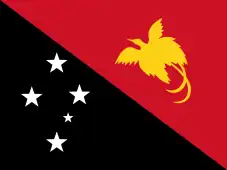
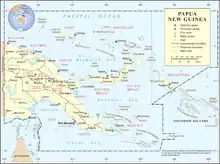
The following outline is provided as an overview of and topical guide to Papua New Guinea:
The Independent State of Papua New Guinea is a sovereign island nation of Oceania comprising the eastern half of the Island of New Guinea[lower-alpha 1] and numerous offshore islands in the western South Pacific Ocean.[1] Papua New Guinea is located in a region defined since the early 19th century as Melanesia. Its capital, and one of its few major cities, is Port Moresby. It is one of the most diverse countries on Earth, with over 850 indigenous languages and at least as many traditional societies, out of a population of just under 6 million. It is also one of the most rural, with only 18 per cent of its people living in urban centres.[2] The country is also one of the world's least explored, culturally and geographically, and many undiscovered species of plants and animals are thought to exist in the interior of Papua New Guinea.
The majority of the population live in traditional societies and practise subsistence-based agriculture. These societies and clans have some explicit acknowledgement within the nation's constitutional framework. The PNG Constitution (Preamble 5(4)) expresses the wish for traditional villages and communities to remain as viable units of Papua New Guinean society,[3] and for active steps to be taken in their preservation. The PNG legislature has enacted various laws in which a type of tenure called "customary land title" is recognised, meaning that the traditional lands of the indigenous peoples have some legal basis to inalienable tenure. This customary land notionally covers most of the usable land in the country (some 97% of total land area);[4] alienated land is either held privately under State Lease or is government land. Freehold Title (also known as fee simple) can only be held by Papua New Guinea citizens.[5]
The country's geography is similarly diverse and, in places, extremely rugged. A spine of mountains runs the length of the island of New Guinea, forming a populous highlands region. Dense rainforests can be found in the lowland and coastal areas. This terrain has made it difficult for the country to develop transportation infrastructure. In some areas, planes are the only mode of transport. After being ruled by three external powers since 1884, Papua New Guinea gained its independence from Australia in 1975.
General reference
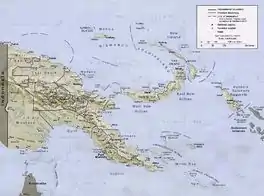
- Pronunciation: /ˈpæpwə njuː ˈɡɪni/
- Common English country name: Papua New Guinea
- Official English country name: The Independent State of Papua New Guinea
- Adjectives: Papua New Guinean
- Demonym(s): Papua New Guinean
- Etymology: Name of Papua New Guinea
- International rankings of Papua New Guinea
- ISO country codes: PG, PNG, 598
- ISO region codes: See ISO 3166-2:PG
- Internet country code top-level domain: .pg
Geography of Papua New Guinea
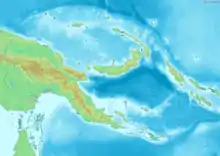
- Papua New Guinea is...
- a country (on an island)
- Location:
- Southern Hemisphere and Eastern Hemisphere
- Pacific Ocean
- South Pacific
- Oceania
- Melanesia
- New Guinea (eastern half)
- Melanesia
- Oceania
- South Pacific
- Time zone: UTC+10
- Extreme points of Papua New Guinea
- High: Mount Wilhelm 4,509 m (14,793 ft)
- Low: Coral Sea and South Pacific Ocean 0 m
- Land boundaries:
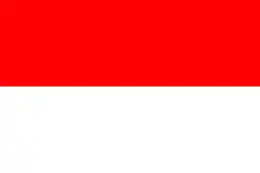 Indonesia 820 km
Indonesia 820 km - Coastline: 5,152 km
- Population of Papua New Guinea: 6,331,000 – 101st most populous country
- Area of Papua New Guinea: 245,857 km2
- Atlas of Papua New Guinea
Environment of Papua New Guinea
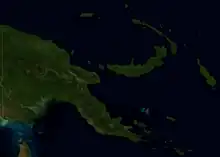
Environment of Papua New Guinea
- Climate of Papua New Guinea
- Environmental issues in Papua New Guinea
- Renewable energy in Papua New Guinea
- Geology of Papua New Guinea
- Protected areas of Papua New Guinea
- Biosphere reserves in Papua New Guinea
- National parks of Papua New Guinea
- Wildlife of Papua New Guinea
Natural geographic features of Papua New Guinea
- Islands of Papua New Guinea
- Lakes of Papua New Guinea
- Mountains of Papua New Guinea
- Rivers of Papua New Guinea
- Waterfalls of Papua New Guinea
- Valleys of Papua New Guinea
- World Heritage Sites in Papua New Guinea
Regions of Papua New Guinea
Ecoregions of Papua New Guinea
List of ecoregions in Papua New Guinea
- Ecoregions in Papua New Guinea
Administrative divisions of Papua New Guinea
Administrative divisions of Papua New Guinea
Provinces of Papua New Guinea
Districts of Papua New Guinea
Municipalities of Papua New Guinea
Local-level governments of Papua New Guinea
- Capital of Papua New Guinea: Port Moresby
- Cities of Papua New Guinea
Demography of Papua New Guinea
Government and politics of Papua New Guinea
- Form of government: parliamentary monarchy (Commonwealth realm)
- Capital of Papua New Guinea: Port Moresby
- Elections in Papua New Guinea
- Political parties in Papua New Guinea
Branches of the government of Papua New Guinea
Government of Papua New Guinea
Executive branch of the government of Papua New Guinea
Legislative branch of the government of Papua New Guinea
Judicial branch of the government of Papua New Guinea
Court system of Papua New Guinea
Foreign relations of Papua New Guinea
Foreign relations of Papua New Guinea
- Diplomatic missions in Papua New Guinea
- Diplomatic missions of Papua New Guinea
- Australia-Papua New Guinea relations
International organization membership
The Independent State of Papua New Guinea is a member of:[1]
Law and order in Papua New Guinea
Military of Papua New Guinea
- Command
- Commander-in-chief:
- Ministry of Defence of Papua New Guinea
- Commander-in-chief:
- Forces
- Army of Papua New Guinea
- Navy of Papua New Guinea
- Air Force of Papua New Guinea
- Special forces of Papua New Guinea
- Military history of Papua New Guinea
- Military ranks of Papua New Guinea
History of Papua New Guinea
- Timeline of the history of Papua New Guinea
- Current events of Papua New Guinea
- Military history of Papua New Guinea
Culture of Papua New Guinea
- Architecture of Papua New Guinea
- Cuisine of Papua New Guinea
- Festivals in Papua New Guinea
- Languages of Papua New Guinea
- Media in Papua New Guinea
- National symbols of Papua New Guinea
- People of Papua New Guinea
- Public holidays in Papua New Guinea
- Records of Papua New Guinea
- Religion in Papua New Guinea
- Bahá'í Faith in Papua New Guinea
- Christianity in Papua New Guinea
- Hinduism in Papua New Guinea
- Islam in Papua New Guinea
- Judaism in Papua New Guinea
- Sikhism in Papua New Guinea
- World Heritage Sites in Papua New Guinea
Art in Papua New Guinea
- Art in Papua New Guinea
- Cinema of Papua New Guinea
- Literature of Papua New Guinea
- Music of Papua New Guinea
- Television in Papua New Guinea
- Theatre in Papua New Guinea
Sports in Papua New Guinea
Economy and infrastructure of Papua New Guinea
- Economic rank, by nominal GDP (2007): 133rd (one hundred and thirty third)
- Agriculture in Papua New Guinea
- Banking in Papua New Guinea
- National Bank of Papua New Guinea
- Communications in Papua New Guinea
- Companies of Papua New Guinea
- Currency of Papua New Guinea: Kina
- Energy in Papua New Guinea
- Energy policy of Papua New Guinea
- Oil industry in Papua New Guinea
- Mining in Papua New Guinea
- Tourism in Papua New Guinea
- Transport in Papua New Guinea
- Papua New Guinea Stock Exchange
Education in Papua New Guinea
Infrastructure of Papua New Guinea
- Health care in Papua New Guinea
- Transportation in Papua New Guinea
- Water supply and sanitation in Papua New Guinea
See also
Note
- ↑ The western portion of the Island of New Guinea is a part of Indonesian provinces of Papua and West Papua.
References
- 1 2 "Papua New Guinea". The World Factbook. United States Central Intelligence Agency. 2 July 2009. Retrieved 23 July 2009.
- ↑ "World Bank data on urbanisation". World Development Indicators. World Bank. 2005. Archived from the original on 3 February 2009. Retrieved 15 July 2005.
- ↑ "Constitution of Independent State of Papua New Guinea (consol. to amendment #22)". Pacific Islands Legal Information Institute. Retrieved 16 July 2005.
- ↑ Lynne Armitage. "Customary Land Tenure in Papua New Guinea: Status and Prospects" (PDF). Queensland University of Technology. Archived from the original (PDF) on 6 September 2005. Retrieved 15 July 2005.
- ↑ HBW International Inc. (10 September 2003). "Facilitating Foreign Investment through Property Lease Options" (PDF). p. 9. Archived from the original (PDF) on 25 September 2007. Retrieved 28 August 2007. See footnote 30 which explains that the precise reference in legislation was not found.
External links
![]() Wikimedia Atlas of Papua New Guinea
Wikimedia Atlas of Papua New Guinea
